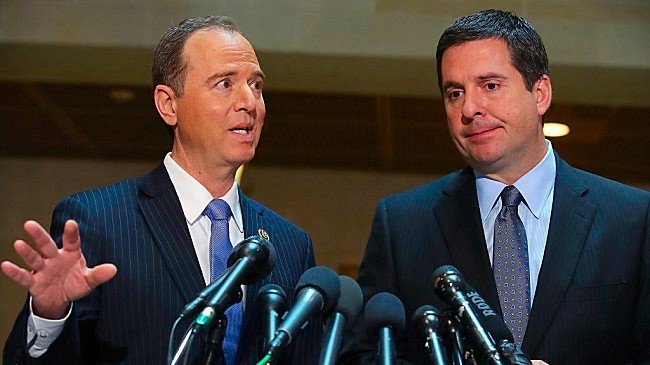
While Rep. Devin Nunes (R-California) was speaking at the Conservative Political Action Conference (CPAC) on Saturday, the House Intelligence Committee released a heavily redacted version of the memo they compiled to counter his own, which President Trump released earlier this month. According to the New York Times, the Democratic memo — which was written by Nunes’ House Intelligence Committee colleague Rep. Adam Schiff (D-California) — “counters” its predecessor’s claims that Justice Department and FBI officials “abused their powers in spying on a former Trump campaign aide.”
Seeing as how so much of Schiff’s memo was redacted (unlike the one Nunes wrote), analysts at the Times and elsewhere cannot be too precise at this early stage. According to CNN, however, two of its arguments are nonetheless crystal clear. First, it claims that everything about the FBI’s FISA warrant on then-Trump campaign adviser Carter Page “was proper,” and second, what — if any — political motivations ex-British intelligence agent Christopher Steele’s dossier may have possessed “were sufficiently disclosed.”
As the memo itself states, “The FBI’s concern about and knowledge of Page’s activities therefore long predate the FBI’s receipt of Steele’s information.” What’s more, “Steele’s reporting did not reach the counterintelligence team investigating Russia at FBI headquarters until mid-September 2016, more than seven weeks after the FBI opened its investigation, because the probe’s existence was so closely held within the FBI.”
Unsurprisingly, the White House subsequently released a statement insisting that the Democratic memo offered nothing that could disprove the president’s prior claim that Nunes’ memo vindicated him and his campaign of alleged collusion. “While the Democrats’ memorandum attempts to undercut the President politically, the President supported its release in the interest of transparency,” it read. “Nevertheless, this politically driven document fails to answer serious concerns raised by the Majority’s memorandum about the use of partisan opposition research from one candidate.”
(Via New York Times and CNN)
